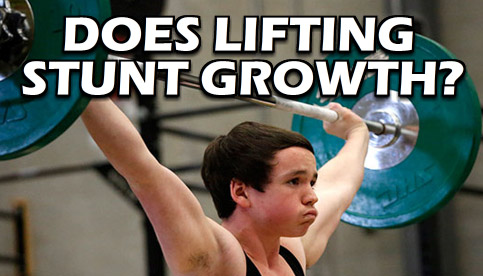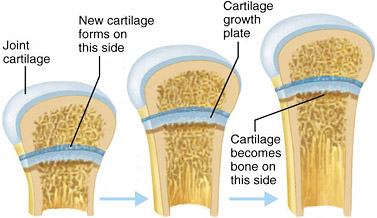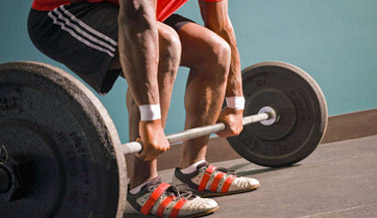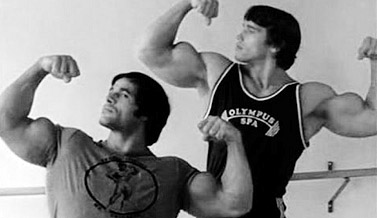DOES WEIGHT LIFTING STUNT GROWTH? THE RESEARCH-BACKED FACTS

Does weight lifting stunt growth?
This is a common question that I get from guys in their early to mid teens who are wanting to begin a weight training program to build up their overall muscle size and strength.
They’re ready and motivated to start hitting the gym consistently, but at the same time are worried that it may negatively affect their height growth as they get older.
The idea that “weight training stunts growth” has been floating around in the bodybuilding and fitness community for many years now, but is it actually based on real science or is it just another outdated myth that should be ignored?
Let’s go over it…
How The Process Of Height Growth Works

To put it in simple terms, the way you grow taller is through the lengthening of the body’s long bones.
In the upper body this includes the humerus (upper arm bone) and radius/ulna (forearm bones), and in the lower body it includes the femur (thigh bone) and the tibia/fibula (lower leg bones).
Located at the ends of each of these long bones are the epiphyseal plates, also referred to as “growth plates”.
As you progress from childhood into puberty, these growth plates gradually cause the bones to lengthen by creating cartilage at the ends which is then converted into actual hard bone.
When puberty is complete, the growth plates are “locked” in order to prevent the bones from lengthening any further.
Once this point is hit, your height is basically set for life and you won’t grow any taller after that.
So, in order for weightlifting to actually stunt your growth, it would have to negatively impact the functioning of the body’s growth plates in some way.
But is there any connection between resistance training and growth plate function that should be a cause for concern?
Does Weight Lifting Affect Growth Plate Function?

According to the extensive research that has been conducted on the subject, the simple answer is no.
When performed properly and responsibly, weight training is just as safe for young lifters as it is for those who are fully grown, and it doesn’t appear to have any adverse effect on the functioning of the body’s growth plates.
As stated by the American Association Of Pediatrics…
“Appropriate strength training programs have no apparent adverse effect on linear growth, growth plates or the cardiovascular system”.
Another study entitled “Strength Training in Children and Adolescents” reviewed relevant studies dating all the way back to 1980 up to 2008 and concluded:
“Strength training, when performed in a controlled, supervised environment, can help children and adolescents of all athletic abilities safely improve their strength and overall health and well-being. The health benefits of strength training far outweigh the potential risks, especially in today’s society where childhood obesity continues to rise.”
Yet another review in the Clinical Journal Of Sports Medicine (“Weight Training In Youth: Growth, Maturation, And Safety“) looked at 22 reports dealing with resistance training programs in young lifters and stated:
“Experimental training protocols with weights and resistance machines and with supervision and low instructor/participant ratios are relatively safe and do not negatively impact growth and maturation of pre and early-pubertal youth.”
So when it all comes down to it, there’s simply no good evidence to back up the common claim that weight lifting stunts growth, and there’s no good reason for younger trainees who are eager to begin a weight training program to shy away for that particular reason.
The Safety Of Weight Training In Comparison To Other Activities

The only situation where weight lifting could feasibly damage a growth plate and potentially stunt your height growth as a result would be through serious, sudden trauma.
In other words, you’d have to physically break a bone or have some other incident occur that caused direct damage to a growth plate, such as dropping a weight on yourself or attempting to max out using extremely heavy weight and improper form which then resulted in injury.
However, in terms of serious, sudden injuries, weight training itself is actually very safe, and is even safer in comparison to many other common activities that teens and younger children regularly engage in.
This includes things like sports (especially rough contact sports) and regular every day activities such as running, jumping, climbing etc.
Unless you’re someone who has chosen to stay home on the couch and avoid all forms of sport and outdoor activity because you’re afraid of injuring yourself, avoiding weight training for reasons of safety really wouldn’t make sense.
Important Guidelines For Younger Lifters To Follow

I’m of course not saying that weight training is totally risk-free by any means, and just like anything else, there’s always going to be a chance for injury if you don’t go about it safely and responsibly.
If you’re a guy or girl in your early to mid teens and have decided to get into the weight room to begin a resistance training program, make sure to employ the following guidelines in order to minimize your risk of injury and to set yourself up for safe, consistent results over the long term…
- Begin your program under the supervision of a more experienced, knowledgeable lifter who can set you up on a properly structured plan and guide you through all of the basics to make sure you’re doing everything in the weight room properly.
- Start out using very light weights and focus on proper form and technique first and foremost before beginning to add more resistance. Once you have the correct form down and begin adding more weight to your lifts, do so slowly and gradually and avoid making any sudden jumps.
- Stick with moderate to higher reps in the 8-15 range and avoid training to muscular failure or maxing out on single rep or low rep sets. If in doubt, always go lighter rather than heavier and keep your overall intensity more on the moderate side.
- Make sure to use a spotter for exercises with higher technical difficulty and that put you in a more vulnerable position, such as squats, bench presses or overhead presses.
- Don’t go overboard on total training volume and frequency. 3-4 weight training workouts per week for about an hour per session is plenty for a beginning lifter.
- Remember that weight training itself is only half of the equation when it comes to improving body composition and strength. You’ll also want to focus on developing the right nutritional habits to go along with it by basing your diet primarily around lean/high quality proteins, minimally processed/high fiber carbs, fruits, vegetables, healthy fats and plenty of water each day.
- Don’t fall for the supplement hype. A couple of simple basics can be used if you’re serious about maximizing your results (such as a high quality protein powder, creatine monohydrate and/or multivitamin), but the overwhelming majority of your muscle building and fat burning results will always come down to consistent proper training and nutrition.
Does Weightlifting Stunt Growth? The Bottom Line

So, does weight training stunt growth in any way?
As long as it’s being done safely and responsibly, there’s simply no good reason to assume that this would be an issue of concern.
With the exception of rare situations involving significant sudden trauma that specifically damaged a growth plate, hobbies like weight training, sports and other outdoor activities are not going to increase or decrease your natural height in any noticeable way.
At the end of the day, height is mostly just a matter of genetics and is primarily determined by levels of certain hormones such as growth hormone and IGF-1, as these are the hormones that communicate with the growth plates and influence them to grow.
Assuming you grew up receiving proper nutrition and were not living in a chronically very high stress environment, your final natural height is just not something you’ll be able to control.
If you come from a family of generally shorter individuals or taller individuals, chances are that you’ll likely follow suit.
So, if you’re in your early or mid teens and have made the decision to start a weight lifting program to take control of your fitness, don’t let this outdated myth hold you back.
Consistent proper weight training is a great habit to develop at a young age and will help to build up your confidence, discipline and goal-setting abilities which will serve you well not only in the present, but throughout the rest of your life as well.
If you found this article helpful, make sure to sign up for your FREE custom fitness plan below...




